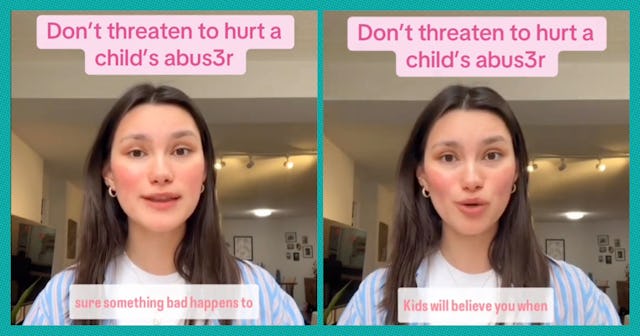One Thing Never To Say To Your Kids About Abusers (And What To Say Instead)
It’s important that our emotions leave space for children to feel safe talking to us.

Nobody wants to think about their child — any child — being abused.
*TRIGGER WARNING: Childhood sexual abuse*
While nobody likes to think about abuse, it’s nevertheless important for children and their parents to be aware of the danger. Teaching kids about inappropriate touch, and the importance of being able to talk to safe adults about anything bad that might have happened, is crucial.
But our desire to make sure our children know they can rely on our protection, some might be making a mistake, says Lexi Koster, a Child Life Specialist and Certified Clinical Trauma Specialist with expertise in childhood sexual assault (CSA) prevention.
“Kids will believe you when you say things like ‘If anybody ever touches your private parts I will make sure something bad happens to them’ or ‘you will never see them again,’” she explains in a video posted to @thebodysafetyexpert on TikTok. “This is a big problem because kids are most often sexually abused by people they know and love, like family members.
“So if they think that you’re going to hurt this person, or send them away so that they never see them again, this might scare them into not disclosing to you and enduring this abuse for a very long time. Instead, if kids ask what will happen to this person, you can say ‘I’ll make sure they get the help they need from trusted professionals, but what happens to them is not your responsibility and it is not your fault.”
It makes sense that, as a parent, we’d want our kids to know that we would do whatever it took to protect them. But at the end of the day, abuse is emotionally complicated for children and adding more promises of violence or isolation onto what they’ve already experienced is more than they should have to handle.
Many commenters, sadly, had first-hand experience with this phenomenon.
“This is really helpful as a school counselor because in my position, many times when students are reporting abuse, it’s of someone they either live with or see often,” one commenter shares. “Although I’m a mental health professional, I’m also an outsider to the family, so it’s important to be mindful of the way I’m speaking about the person they’re reporting, because their feelings towards that person are typically very complex. In my role, one of the quickest ways to destroy rapport is by speaking ill of those close to the student.”
“It was very hard for me to press charges against my abuser because he was my uncle, my parent’s friend, I didn’t want to get him in trouble,” discloses another. “I often had to tell my parents that it wasn’t comforting to hear how they wanted to violently hurt him.”
“My mom said to me ‘Your father and uncle will kill anyone who touches you and go to prison,’” said a third. “I didn't tell anyone for years out of fear of losing them.”
CSA is tragic, complicated, and all-too-common. And sometimes, despite our best intentions, in our own complicated feelings we don’t really grasp how best to help our children. Fortunately, there are good resources out there. Reminders such as this one are a good place to start, but for more information, organizations like the Rape Abuse & Incest National Network (RAINN), Darkness to Light, Brave Movement, and the National Child Traumatic Stress Network all have resources just for parents to learn how to help prevent — or get through — such an unfathomable crime.